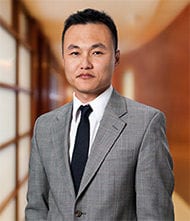
By Leslie Gordon In 1993, at age 16, Edel Gonzalez was sentenced to life without parole for a botched carjacking that resulted in murder. Though he wasn’t the one to pull the trigger, Gonzalez is believed to be the youngest person in Orange County history to have been sentenced to life without parole. During the next 24 years in prison, Gonzalez transformed from an alcoholic, troubled youth into a non-violent, sober and devout man who became a model inmate. This spring, with legal assistance from Bryant Yang ’07, Gonzalez became the first person released from a California prison under two new laws that reflect a changing approach to juvenile justice. The release was two-parted. First, Yang, an associate at Irell & Manella in Los Angeles, obtained the first-ever resentencing under Senate Bill 9, also known as the California Fair Sentencing for Youth Act. According to that 2013 law, the court can consider petitions for resentencing by individuals sentenced to life without the possibility of parole for an offense committed while under 18—once they have served 15 years of the original sentence. In December 2013, Yang convinced the Orange County Superior Court to recall Gonzalez’s original sentence and institute a new parole-eligible sentence of 25 years to life. Since then, lawyers and clinics throughout the state have used Yang’s SB 9 litigation strategy and filings as a model. Later, Yang represented Gonzalez in the parole process set forth in Senate Bill 260, another new law, which revises parole guidelines for juveniles. In October 2014, Yang argued Gonzalez’s case before the Board of Parole Hearings. The board unanimously agreed that Gonzalez did not pose a public safety threat and that he was rehabilitated and had shown sincere remorse. The Board recommended his release, a finding that became final after 120 days. The governor had 30 days to reverse the board’s finding, which he declined to do. In late March, Gonzalez, who expected to die in prison, became a free man at age 40. “It’s an incredible story,” said Berkeley Law’s Barry Krisberg, who served as an expert during the case’s resentencing phase. “His release is extremely rare, a miracle.” Rethinking juvenile sentencing The result reflects a changing jurisprudence about appropriate punishment for young people, Krisberg added. Scientists have discovered that the adolescent brain continues to develop all the way into early adulthood, so there’s a growing trend to rethink life sentences for juvenile offenders.

In California, there are several hundred inmates serving life without parole for offenses committed as juveniles, according to Krisberg, who would like to see more pro bono lawyers doing what Yang did. “Gonzalez was extremely fortunate to have a major law firm that provided excellent legal counsel. But who will be providing the same level of representation and support for other inmates in this situation?” Because Gonzalez was an undocumented immigrant who came to the U.S. from Mexico as a child, he was released to immigration authorities and deported to Tijuana. He’s now mentoring at-risk youth at a Tijuana church. Working with USC’s Post-Conviction Justice Project, Yang served as Gonzalez’s lead attorney, drafting briefs, traveling frequently to the California-Arizona border to prepare Gonzalez for interviews by parole commissioners, and arguing in Superior Court and before the Board of Parole Hearings. “Working as the lead attorney in this case was an amazing opportunity,” Yang said, who typically handles complex business litigation and white collar defense matters. “I got to do things as an associate that are rarer in cases with a paying client.” Yang credits Berkeley Law with igniting his commitment to pro bono matters like the Gonzalez case. “Boalt really instills in all of its graduates the idea that we’re responsible to help the underserved gain access to justice,” he explained. “That sense of obligation has stayed with me.” Yang keeps a piece of Gonzalez’s artwork—signed with a personalized thank-you message—in his office. He’s currently working on a new pro bono case with the Western Center on Law and Poverty representing homeless residents in Kern County. “Bryant Yang is an excellent example,” Krisberg said, “of what our students can do to change the world.”